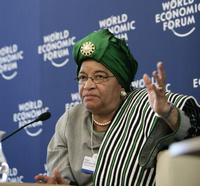MONROVIA, Liberia -- Liberia's Truth and Reconciliation Commission (TRC) released its conclusions last week, and though debate continues on a number of issues, the findings already produced some surprises. In particular, the inclusion of President Ellen Johnson Sirleaf on the list of those recommended to be barred from Liberian politics for the next 30 years turned the most heads, both here and abroad.
Sirleaf, Africa's first elected female head of state, is the darling of the international development community. Many see her as a rare ray of hope in a country, and region, where violence and corruption have for too long perpetuated a cycle of poverty. Support for her efforts in the country runs high, but it is not universal, nor is it unconditional.
In her official statement to the TRC, Sirleaf admitted giving Charles Taylor $10,000 during the early stages of his rebellion in late 1989 and early 1990. Popular belief, though, even among Sirleaf's casual supporters, puts the number much higher. Most also believe that in addition to the financial contributions, Sirleaf also offered Taylor political, moral and material support. Paradoxically perhaps, Sirleaf's name also appears in connection with the Liberians United for Reconciliation and Democracy (LURD) movement, which ultimately ousted Taylor from office in 2003, effectively ending Liberia's civil war.

